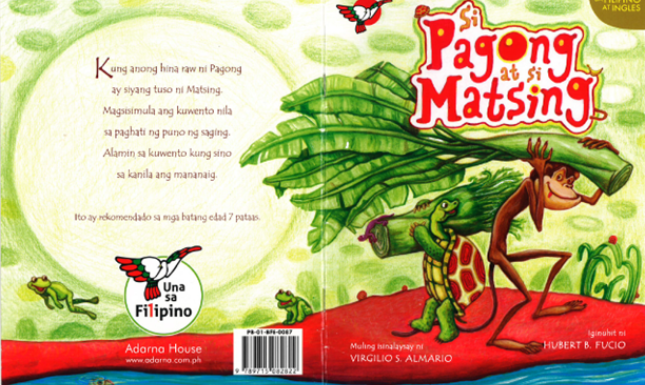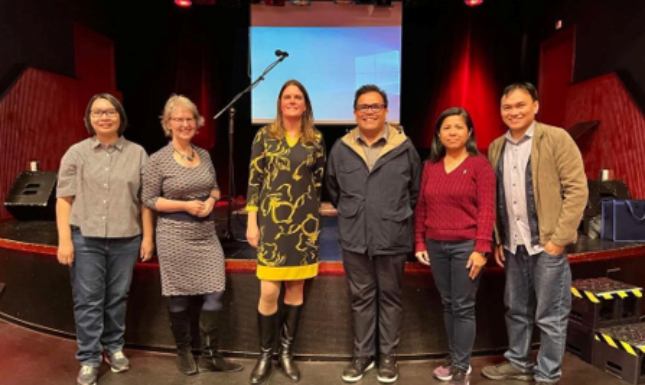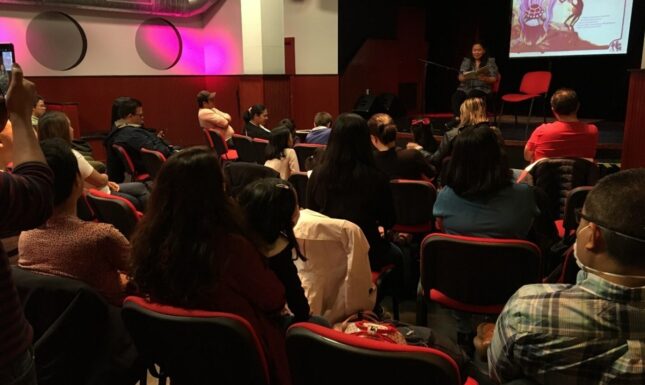The Turtle and the Monkey: A Linguistic Event on Filipino Multilingualism
Reden Valencia Libo-on writes about a recent event organized by LUCL researchers in Leiden, which showcased multilingualism in the context of Filipino children’s literature—attracting children and adults alike.
On September 17, 2022, a team of researchers and staff members from the Leiden University Center for Linguistics (LUCL) organized a storytelling event in Leiden for Filipino-speaking children and their parents. Around 40 people attended this Saturday afternoon event, which was part of a series of events related to the project “A Tale of Two Tongues: The Added Value of Multilingualism” for the Leiden City of Science year.

Leiden and the Philippines
Organized in collaboration with BPlusC, the event was held at Leiden’s Muziekhuis. The city of Leiden was a fitting location because, as one of the organizers Janet Grijzenhout pointed out, “people are usually aware of linguistic diversity when they think of Amsterdam and The Hague, but it also applies to Leiden”. Interestingly, the first Filipino organization in the Netherlands was the Philippine Nurses Association of the Leiden University Medical Center, founded in 1965.
Filipino, based on Tagalog, is the national language of the Philippines, and one of its two official languages together with English. There are approximately 120 to 180 Philippine languages, depending on the way they are classified. A huge majority of the Filipino people either speak or can understand more than two languages.
Fable
The story taking center stage at the event was Si Pagong at si Matsing (The Turtle and the Monkey), a well-known Philippine fable about Pagong (Turtle), who outwits his former friend Matsing (Monkey) over a banana tree. The story was popularized by the Philippine’s national hero José Rizal, who published the story in English in the July 1889 issue of Trübner’s Oriental Record in England. This is considered to be the beginning of Philippine children’s literature. Additionally, Pong Pagong and Kiko Matsing, the main characters of the immensely popular children’s educational TV program Batibot in the 80s and 90s, are based on this very story.
The event started with the introduction of the organizing team: the project leaders Hannah De Mulder and Janet Grijzenhout, together with Alice Morta and Reden Valencia Libo-on.

On behalf of the Philippine Ambassador to the Netherlands, J. Eduardo Malaya, Consul Nomer B. Ado II expressed the Embassy’s appreciation to Leiden University by saying that “through this storytelling activity, these children get to hear and appreciate the Filipino language and different languages, thereby also instilling in them a sense of inclusiveness and openness to various cultures”. He added that “this is a very significant activity in terms of promoting our connection with each other and appreciating not only our diversity but also our similarities and commonalities”.
Activities
A long-time Filipina resident in the Netherlands, Ms. Mary Grace Labasan led the reading of the story of the classic Filipino children’s book Si Pagong at si Matsing (The Turtle and the Monkey) in both Filipino and English.

The storytelling was followed by several creative and interactive activities for the children led by student assistant Iris Kruijsdijk with the help of Alice Morta and Reden Valencia Libo-on. At the same time, Hannah De Mulder gave a presentation for their parents on the importance of reading and multilingualism. The adults engaged in a lively discussion on multilingualism while the kids enjoyed their artwork and small gifts.
To finish up the event, everyone shared drinks, as well as lumpiang shanghai and pancit, which are typically served at Filipino parties and other social gatherings. We would like to thank all the attendees, collaborators and the organizing team for an inspiring and enjoyable afternoon—maraming salamat!

